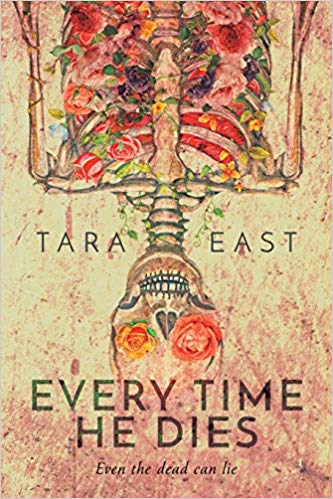Research is an important part of the novel-writing process and the internet makes discovering new information easier than ever, but primary resources offer insight and details you won’t find anywhere online. In this article, author and YouTuber Tara East gives us some tips on how writers can find primary resources.

No matter what genre you’re writing in, it’s highly likely that you will have to do some research.
Some authors conduct their research before they begin drafting, others do it once they have completed a first draft, and others write and research simultaneously.
How you conduct your research is far more important than when.
The following seven tips are aimed at writers who are about to start researching their novel, but everyone can benefit from these suggestions.
The internet makes researching and fact-checking incredibly easy. You needn’t wander down to your local library anymore, now your laptop is the library and all you have to do is type in the keywords.
Researching online is easy and convenient, but writers should not rely on this one source alone. After all, it is not always easy to determine the reliability of the source you are reading and if you are researching a particular industry or profession, you may find contradictory information as workplace procedures vary between countries and corporations.
Online resources are useful, but writers must also make the effort to find primary resources.
A primary resource, in this context, is someone who has first-hand experience or knowledge on a particular topic. If your protagonist is a surgeon, for example, a primary resource would be memoirs or blogs written by surgeons. These resources will improve your understanding of the profession, but you will gain even more insight by interviewing a surgeon.
Speaking with an industry professional will provide unique details and insights that you can’t find online. Plus, you’ll be able to ask questions that pertain directly to the novel that you’re writing.
Good research contains both primary and secondary resources. The following seven tips will guide you through both of these approaches.
1. Familiarise yourself with the topic
Before you start reaching out to primary resources, you should familiarise yourself with the topic you’re researching. Think of this stage as a research warm-up.
Open up your web browser and give yourself full permission to go down the rabbit hole. Experiment with different keywords and make sure that you have a notebook beside you or a word document open so that you can record reoccurring terminology or any questions that arise while you are reading.
Look for newspaper articles, feature stories, interviews or fact sheets. You can also read blogs, essays, interviews, and memoirs.
Caveats to online research are knowing the difference between productive reading and procrastination, and discernment regarding the reliability and credibility of online resources is also needed.
If you find a useful article or web page, be sure to make a record of it so that you can return to later.
2. Tap into your existing network
Secondary resources and online research are a great way to ensure that minor aspects of your novel are correct, for example, when you are looking up weapons or maps.
However, there may be major aspects of your novel that require greater understanding, or perhaps you are writing about a topic that has little information online.
In this instance, you’ll likely need to interview someone who has first-hand experience or knowledge on the topic.
Before you start emailing random strangers, considering tapping into your existing network. Ask your family and friends if they know anyone relevant to your research. You may be surprised to discover that you and your ideal resource are separated by only six degrees!
I spent two years trying to find an embalmer who’d be willing to speak with me. One night, I was complaining about this fact while having dinner with a friend, she immediately whipped out her phone and fired off an email. As it turned out, she went to school with a guy whose family owned a chain of funeral parlors. A week later, I got my interview.
3. Pay attention at conferences and events
When meeting other authors and industry professionals at conferences and events, be sure to pay attention to their current project and publishing/work history.
You may meet a crime writer who has great connections with the local police force; if appropriate, you could ask that writer to introduce you to an officer who’d be open to an interview. Now, you have a fantastic resource that will assist you in the writing of your crime novel.
You can build so many connections by attending writing conferences and events or by joining local writing groups. You can then draw upon this network whenever you need help finding reliable primary resources.
For example, I met a retired detective through a writing course. While he decided to leave the course a week later, we stayed in contact via email. Not only did he agree to be interviewed (multiple times!), he also fact-checked the novel and became an early beta-reader.
4. Reach out to resources
If you’re struggling to connect with resources using the methods outlined in tips two and three, you may need to reach out to industry professions directly – without an introduction.
You can email resources directly by finding their contact information online. Make sure your email is professional and polite, remember: you are asking someone to give up their time for no personal benefit.
In your email, be sure to include: your name, why you would like to interview them, some information regarding your project, your background/bio, and the kind of questions you’d like to ask.
For example:
Hi John,
My name is Tara and I am currently writing a crime novel. I read a recent interview with you in [X] magazine and was impressed by your long history working as a [X].
I am writing to you today in the hopes that you’d be interested in me interviewing you. Your knowledge of the industry is extensive, and my novel would benefit tremendously from your insights and experience.
The protagonist in my novel is a detective on the verge of retiring. While attempting to resolve his remaining active cases, his life is disrupted in a twenty-year-old case is suddenly reopened.
I am looking for details regarding your daily work routines, police procedure and your reflections on the job in general. I have previously published two books and have an active website, which you can look at here: [insert website].
Thank you so much for considering my request, and I look forward to your response.
Regards,
Tara
Emails are an easy and non-intrusive way to request an interview with someone. You can approach professionals in person, provided it is appropriate to do so, but email gives people the time to reflect on your request. Also, some people may not appreciate being put on the spot! A thoughtfully written email can open more doors than you may expect.
5. Prepare
Spend some time thinking about what you need to know before you go in for the interview. Ideally, you’ve already done extensive background research on the topic, so use your time with your interviewee as a way to fact-check the information you’ve found online or through other resources.
For example, if you are writing a police procedural set in Melbourne, Australia but most of the information online pertains to American procedures, then ask your interviewee to clarify local workplace policies and processes.
As already stated, the interviewee is giving up their time for no personal gain. So, make sure that you have your questions ready before you go into the interview.
Feel free to discuss any (relevant) plot points with them that you are struggling with. Layout the scenario and ask them what would realistically happen in this situation. If there are any scenes where believability is an issue, ask the interviewee if what you have written is possible.
Remember, you’ve chosen this interviewee for their expertise, so don’t be afraid to ask for advice or clarification on any of the relevant technical plot points you are struggling with.
When I was interviewing police officers for my mystery novel, I asked them to walk me through standard homicide procedures. Then, I outline two specific scenes where I was unsure what the police procedure would be and I asked them what they would in that situation.
6. Ask for details
Details: the one thing a primary resource can provide that online sources can’t.
If you are interviewing your resource in their place of work, make sure that you pay attention to the surroundings. What is the layout of the building? What is the quality of light like and how does it smell? Is it busy, loud? How does the place feel, somber, stressful, hectic, calm?
Ask the interviewee for specific details. What is their typical day like? What are the best and worst parts of their job?
As you warm up into the interview, ask them about any unusual cases or events they’ve been involved in or any interesting workplace stories they’d like to share.
If they are working in a high-stress or unusual job, ask them how they feel about the work and how it affects them emotionally and mentally. Note: You will have to use your judgment before asking these personal questions as not everyone will be comfortable answering them.
If the person works in a harsh or physical environment, you can ask them how their work has affected them physically.
The kind of details you are looking for will change depending on the topic you are researching and the person you are interviewing. Think about the tactile details (sound, touch, sight, smell, taste) you need to know to make a scene come alive.
For example, when interviewing embalmers, I asked to smell the chemicals they use when preparing a body for a funeral. I got them to walk me through a typical day and to show me the equipment that they use. I also asked them how they answer the question, what do you do for a living? at cocktail parties. Their answer – bricklayer, it has a lot less follow up questions! – was so good that I put it in my book.
7. Be polite and professional
Being polite and professional is a good habit regardless of who you are speaking to, but in this instance, it is even more important.
If you carefully prepare for your interview, ask good questions, act courteously and thank your interviewee for their time, it’s far more likely that you will build a good rapport.
If it feels appropriate to do so, ask the interviewee if they’d be open to checking any of the scenes relevant to their profession or if they’d be happy for you to email them for clarification or further details.
Ideally, you want to leave this interview knowing that you can contact this person again if any additional questions arise (and they will!) during the writing process.
When writing my crime novel, I was able to email my police officer contacts to check minor details like lingo, how long you can detain someone without evidence, and how technology has changed workplace procedures.
Finding the right professionals to interview can take a little time, but it’s well worth the effort.
The details gained by conducting interviews with primary resources can add credibility, authenticity, and intrigue to your book. Several of my early readers said that the embalming scenes in my novel were among their favorite because the sensory details made it feel so real.
A primary resource will provide you with insights that the internet can’t, and it is these details that will take your work to the next level.
How do you conduct research for your books? Please leave your thoughts below and join the conversation.
 Tara East is an author, blogger, and YouTuber. She has four degrees and her articles on culture and creativity are widely published. Her fictitious works include the mystery novel Every Time He Dies and the Time-traveling novella When Bell Met Bowie. She maintains a highly active writing advice blog at taraeast.com
Tara East is an author, blogger, and YouTuber. She has four degrees and her articles on culture and creativity are widely published. Her fictitious works include the mystery novel Every Time He Dies and the Time-traveling novella When Bell Met Bowie. She maintains a highly active writing advice blog at taraeast.com
[Library shelves image copyright chuttersnap and Unsplash. Doctor image copyright impulseQ and Unsplash.]




